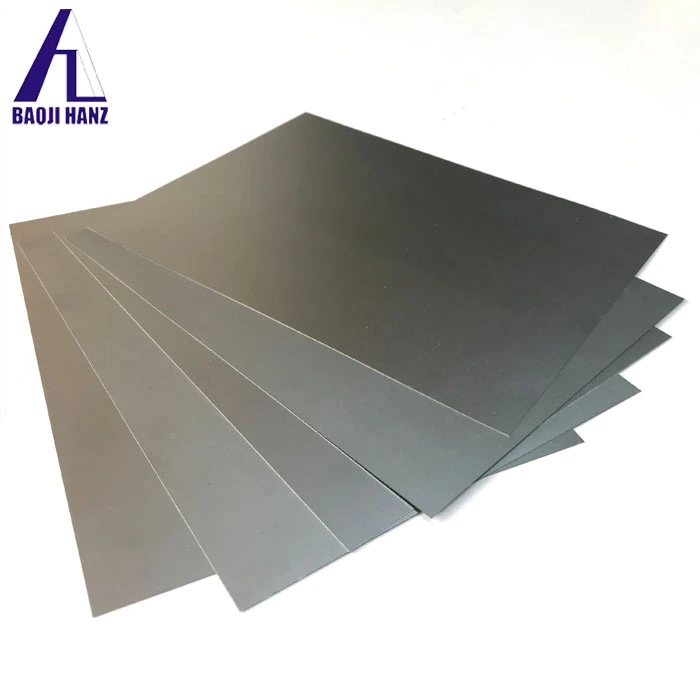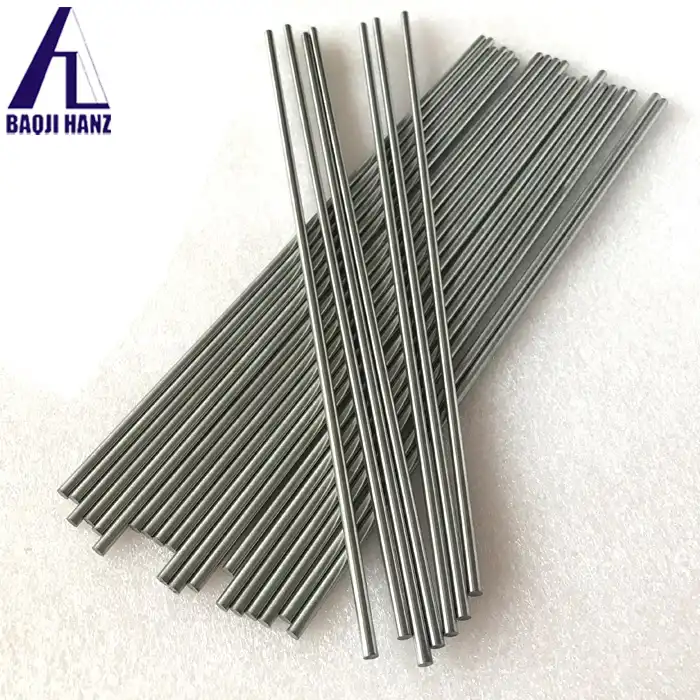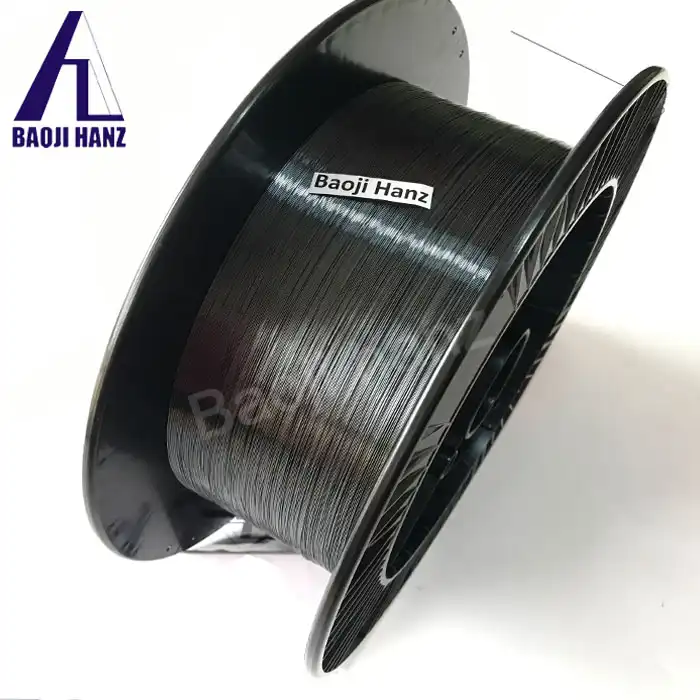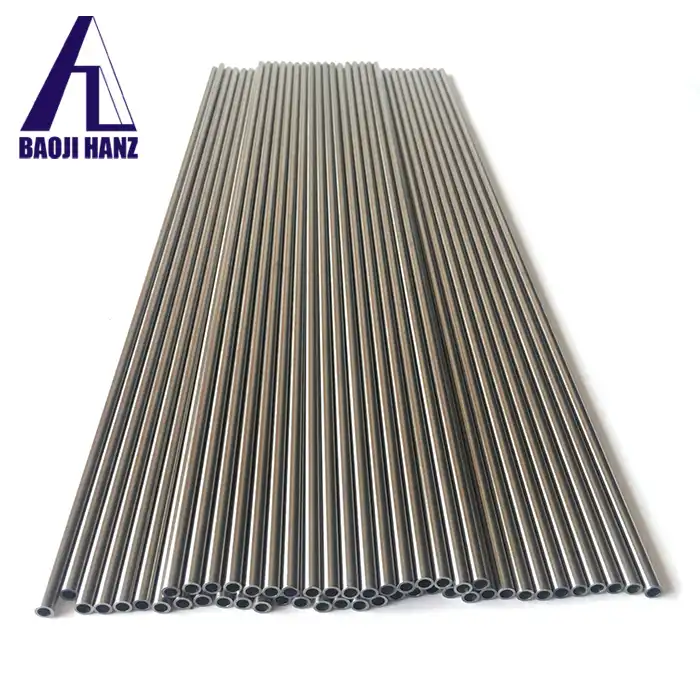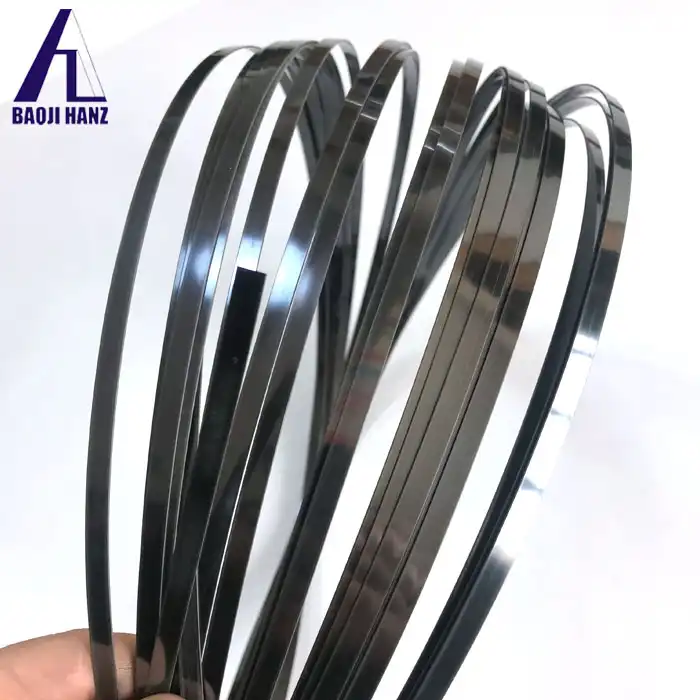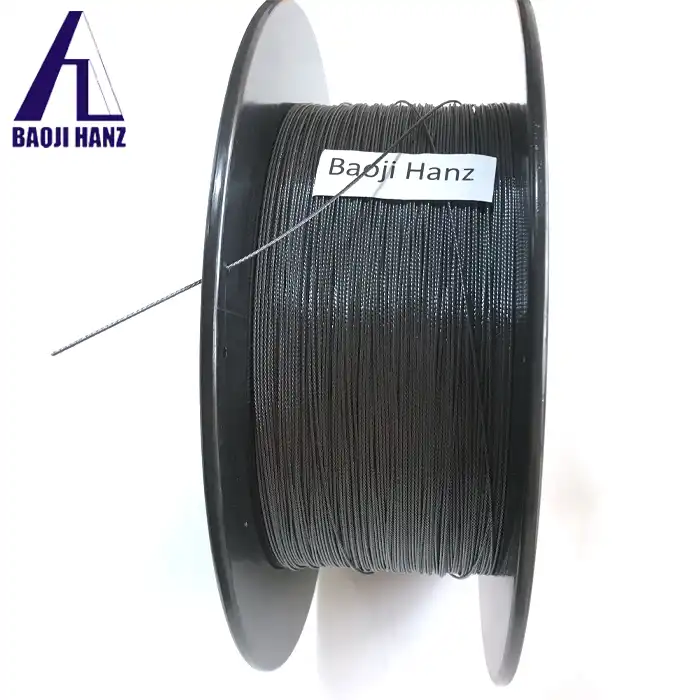Can Nickel-Titanium Alloy Strands Be Customized?
2025-04-21 20:34:40
Nickel-Titanium Alloy Strands can absolutely be customized to meet specific industry needs and application requirements. These remarkable materials, commonly known as Nitinol strands, offer exceptional versatility through customization options including diameter specifications, temperature transformation ranges, surface treatments, and mechanical property adjustments. At Baoji Hanz Metal Material Co., Ltd., we specialize in tailoring Nickel-Titanium Alloy Strands to precise customer specifications, leveraging our advanced production facilities and technical expertise to deliver customized solutions that enhance performance across medical, aerospace, automotive, and industrial applications.
Customization Parameters for Nickel-Titanium Alloy Strands
Dimensional Customization Options
Nickel-Titanium Alloy Strand customization begins with precise dimensional specifications. Our manufacturing capabilities allow for diameter customization ranging from ultra-fine 0.1mm wires to robust 5mm strands, addressing diverse application requirements across industries. This dimensional flexibility is achieved through our sophisticated wire drawing processes, where each Nickel-Titanium Alloy Strand undergoes precise reduction to achieve the exact diameter required for specific applications. The dimensional precision is critical for applications in medical devices where micron-level accuracy determines functionality, such as in guidewires and catheter reinforcements.
Beyond diameter specifications, length customization represents another crucial parameter for Nickel-Titanium Alloy Strand applications. While our standard production maintains a minimum order quantity of 500 meters, we routinely accommodate custom length requirements for specialized projects. This flexibility proves particularly valuable for research institutions and specialized industrial applications where exact length specifications are essential for prototype development and testing purposes. Our advanced winding and spooling techniques ensure uniform tension throughout custom-length Nickel-Titanium Alloy Strands, eliminating irregularities that might compromise performance in critical applications.
The customization process also extends to strand configuration, where multiple Nickel-Titanium Alloy Strand wires can be twisted or braided in various patterns to enhance specific mechanical properties. These configurations include simple twisted pairs, complex multi-strand braids, and hybrid constructions incorporating other materials. Each configuration modifies the fundamental performance characteristics of the Nickel-Titanium Alloy Strand, allowing engineers to optimize attributes such as flexibility, tensile strength, and torque transmission for specific applications. Our manufacturing facility employs specialized braiding equipment capable of producing these complex configurations with consistent quality and performance characteristics.
Composition and Thermal Customization
The composition of Nickel-Titanium Alloy Strands represents a critical customization parameter that directly influences performance characteristics. While the standard composition centers around the near-equiatomic NiTi alloy, slight adjustments to the nickel-titanium ratio significantly alter transformation temperatures and mechanical properties. Our metallurgical expertise allows precise adjustment of these composition ratios to achieve specific transformation behaviors. For example, nickel-rich compositions typically demonstrate lower transformation temperatures, while titanium-rich compositions exhibit higher transformation points. This compositional customization enables the Nickel-Titanium Alloy Strand to demonstrate its shape memory effect within precisely defined temperature ranges.
Temperature sensitivity represents another customizable aspect of Nickel-Titanium Alloy Strands, with our standard products offering operational ranges from -50°C to 100°C. However, through specialized heat treatment protocols and compositional adjustments, we can customize the exact transformation temperatures at which the material transitions between austenitic and martensitic phases. This customization proves crucial for applications requiring precise actuation at specific temperatures. The customization process involves sophisticated thermal processing methods, including precisely controlled aging treatments, that establish the crystallographic structure necessary for the desired transformation characteristics in the Nickel-Titanium Alloy Strand.
Thermal cycling stability represents an additional customizable parameter, particularly important for applications where the Nickel-Titanium Alloy Strand must maintain consistent performance over thousands of transformation cycles. Through specialized thermomechanical treatments, we can stabilize the material's microstructure to minimize performance degradation during repeated thermal cycling. This customization particularly benefits aerospace and industrial applications where reliable actuation throughout the component lifetime is essential. Our materials scientists work closely with customers to determine the specific thermal cycling requirements for each application, then develop custom processing protocols to achieve the desired stability in the Nickel-Titanium Alloy Strand.
Surface and Performance Customization
Surface treatment customization significantly extends the application possibilities for Nickel-Titanium Alloy Strands. While the base material demonstrates excellent corrosion resistance, additional surface treatments enhance specific performance characteristics for demanding environments. Available surface customizations include electropolishing for improved biocompatibility in medical applications, black oxide coatings for reduced reflectivity in optical systems, and specialized polymer coatings for electrical insulation or friction reduction. Each treatment modifies the Nickel-Titanium Alloy Strand's surface properties while preserving its fundamental mechanical characteristics, allowing for optimized performance in specialized applications.
Performance customization extends to mechanical properties, with our manufacturing processes capable of producing Nickel-Titanium Alloy Strands with tailored stiffness, elasticity, and force delivery characteristics. Through controlled cold working and precision heat treatment, we can adjust the superelastic plateau, loading and unloading characteristics, and fatigue resistance to match specific application requirements. This customization capability proves particularly valuable in medical device applications, where precise force delivery is critical for therapeutic outcomes. Our materials engineering team works closely with design engineers to determine the optimal performance characteristics for each application, then develops specific processing protocols to achieve these properties in the Nickel-Titanium Alloy Strand.
Quality certification represents the final aspect of customization, particularly important for regulated industries like medical device manufacturing. Our Nickel-Titanium Alloy Strand manufacturing processes comply with ISO 9001:2015 and ISO 13485:2016 standards, with additional certifications available to meet specific industry requirements. This customization includes detailed material certifications, process validation documentation, and specialized testing protocols to verify that the Nickel-Titanium Alloy Strand meets all specified performance requirements. For medical applications, we can provide full traceability documentation and biocompatibility testing to facilitate regulatory approval processes.
Manufacturing Processes That Enable Customization
Advanced Melting and Alloying Techniques
The customization capabilities of Nickel-Titanium Alloy Strands begin with sophisticated melting and alloying processes that establish the fundamental material properties. Our facility employs vacuum induction melting technology to produce high-purity NiTi ingots with precisely controlled compositions. This melting process eliminates impurities that could compromise the performance of the final Nickel-Titanium Alloy Strand, ensuring consistency in both chemical composition and mechanical properties. The vacuum environment prevents oxygen contamination, which could otherwise create titanium oxide inclusions that act as stress concentrators and potential failure points in high-stress applications.
Following the initial melting process, secondary remelting techniques such as vacuum arc remelting further refine the microstructure of the Nickel-Titanium Alloy Strand material. This additional processing step improves compositional homogeneity throughout the ingot, eliminating segregation that might lead to inconsistent performance in the final product. For applications requiring exceptional purity and performance consistency, multiple remelting operations can be performed to achieve the highest possible material quality. The precise control of composition during these melting operations allows us to tailor the transformation temperatures and mechanical properties of the Nickel-Titanium Alloy Strand to meet specific customer requirements.
The transformation from ingot to Nickel-Titanium Alloy Strand involves multiple hot working operations, including forging and hot rolling, to break down the as-cast structure and develop a uniform, refined grain structure. These hot working operations require precise temperature control to maintain the desired microstructure while avoiding oxidation or other surface contaminations. Our manufacturing process incorporates sophisticated temperature monitoring and control systems that maintain optimal processing conditions throughout these operations. The resulting semi-finished products exhibit uniform properties throughout their cross-section, providing an excellent foundation for subsequent cold working operations that will produce the final Nickel-Titanium Alloy Strand dimensions.
Precision Wire Drawing and Heat Treatment
The transformation from bar stock to fine Nickel-Titanium Alloy Strand requires sophisticated wire drawing equipment and expertise. Our manufacturing facility employs multi-stage drawing processes with diamond dies that gradually reduce the material diameter while maintaining dimensional accuracy and surface quality. The drawing process introduces significant cold work into the material, fundamentally altering its mechanical properties and transformation behavior. This cold work provides a critical mechanism for customizing the Nickel-Titanium Alloy Strand's performance characteristics, with the degree of cold reduction carefully controlled to achieve specific property profiles.
Heat treatment represents perhaps the most critical customization process for Nickel-Titanium Alloy Strands, as it establishes the final transformation temperatures and mechanical behavior. Our facility employs precision-controlled heat treatment furnaces capable of maintaining tight temperature tolerances throughout the processing cycle. Different heat treatment protocols produce distinctly different properties in the final Nickel-Titanium Alloy Strand – from fully annealed material exhibiting classic shape memory behavior to partially work-hardened material demonstrating superelastic properties at room temperature. Through careful calibration of these heat treatment parameters, we can customize the exact behavior of the Nickel-Titanium Alloy Strand to match specific application requirements.
The sequence of cold working and heat treatment operations determines the final properties of the Nickel-Titanium Alloy Strand. Depending on the desired characteristics, multiple drawing and annealing cycles may be employed to achieve specific combinations of strength, flexibility, and transformation behavior. Our process engineers have developed proprietary sequences that optimize these properties for different application requirements. For medical applications requiring exceptional fatigue resistance, we employ specialized thermomechanical processing routes that impart particular crystallographic textures to the Nickel-Titanium Alloy Strand. Similarly, aerospace applications demanding maximum strain recovery receive custom processing sequences that optimize these specific characteristics.
Specialized Testing and Quality Assurance
Quality assurance for custom Nickel-Titanium Alloy Strands requires sophisticated testing equipment and protocols that verify both dimensional accuracy and functional performance. Our facility employs laser micrometer systems capable of measuring strand diameters with micron-level precision, ensuring compliance with tight dimensional tolerances. Surface inspection systems identify any imperfections that might compromise performance, while mechanical testing equipment evaluates tensile strength, elongation, and cycling stability. These comprehensive quality protocols ensure that each custom Nickel-Titanium Alloy Strand meets all specified requirements before shipment.
Functional testing represents a critical aspect of quality assurance for custom Nickel-Titanium Alloy Strands, particularly for shape memory and superelastic applications. Our testing laboratory includes differential scanning calorimetry equipment that precisely measures transformation temperatures, verifying that the material will perform as expected in the intended application environment. Load-displacement testing equipment evaluates the superelastic performance characteristics, including plateau stresses and hysteresis behavior. For strand assemblies, specialized fixtures evaluate factors such as torque transmission, kink resistance, and other application-specific performance characteristics of the Nickel-Titanium Alloy Strand.
Documentation and traceability systems support our customization capabilities by maintaining comprehensive records of all processing parameters and testing results. Each batch of Nickel-Titanium Alloy Strand receives unique identification that enables complete traceability from raw material through finished product. This documentation proves particularly valuable for medical and aerospace applications, where regulatory requirements demand comprehensive material history. Our quality management system, certified to ISO 9001:2015 and ISO 13485:2016 standards, ensures consistent application of these traceability protocols across all custom Nickel-Titanium Alloy Strand production.
Application-Specific Customization Examples
Medical Device Customization
The medical sector represents one of the most demanding application areas for customized Nickel-Titanium Alloy Strands, with requirements that push the boundaries of material performance. Guidewire applications, for example, require complex combinations of stiffness gradients, torque transmission, and kink resistance that can only be achieved through specialized customization. Our manufacturing processes enable the production of Nickel-Titanium Alloy Strands with variable diameter sections, specialized tip configurations, and hybrid constructions that incorporate multiple materials. These customizations enable medical device engineers to develop minimally invasive devices that navigate complex anatomical pathways while maintaining excellent control characteristics.
Stent applications represent another area where Nickel-Titanium Alloy Strand customization provides significant clinical benefits. By precisely controlling transformation temperatures, we can produce materials that deploy at body temperature without requiring external heating. Surface treatments enhance biocompatibility and reduce thrombogenicity, critical factors for long-term implants. Our manufacturing capabilities extend to ultra-fine diameter Nickel-Titanium Alloy Strands used in neurovascular applications, where micron-level dimensional control and exceptional flexibility are essential for navigating delicate cerebral vasculature. The biocompatibility of these materials is enhanced through specialized electropolishing processes that create exceptionally smooth surfaces resistant to protein adhesion.
Orthodontic applications benefit from custom Nickel-Titanium Alloy Strands engineered to deliver precise, consistent forces over extended treatment periods. By manipulating the superelastic plateau characteristics through composition and processing adjustments, we can produce wires that deliver optimal tooth-moving forces regardless of deflection amount. This customization capability has revolutionized orthodontic treatment, reducing patient discomfort while improving clinical outcomes. Our Nickel-Titanium Alloy Strand manufacturing process includes specialized testing protocols that verify force delivery characteristics across multiple deflection cycles, ensuring consistent performance throughout the treatment period.
Aerospace and Industrial Customization
Aerospace applications demand Nickel-Titanium Alloy Strands with exceptional reliability and performance stability across extreme environmental conditions. Our customization capabilities include specialized composition and processing routes that maintain transformation characteristics at both cryogenic temperatures encountered at high altitudes and elevated temperatures experienced during supersonic flight. Actuator applications benefit from precisely controlled transformation temperatures that enable reliable operation within specific temperature windows. Additionally, our manufacturing processes can produce Nickel-Titanium Alloy Strands with enhanced fatigue resistance, critical for applications subject to repeated cycling in vibration-intensive environments.
Robotic applications leverage the unique properties of customized Nickel-Titanium Alloy Strands to create biomimetic movement systems that replicate natural muscle behavior. By controlling the superelastic characteristics and transformation temperatures, we can produce materials that respond to electrical stimulation with precise movement control. These applications often require complex strand configurations, including twisted pairs and braided constructions that enhance force generation capabilities. Our manufacturing facility includes specialized equipment for creating these complex Nickel-Titanium Alloy Strand configurations, enabling the development of next-generation robotic systems with human-like movement characteristics.
Industrial equipment benefits from customized Nickel-Titanium Alloy Strands in applications ranging from vibration damping to thermal actuation systems. In these applications, customization often focuses on optimizing cycle life and long-term stability, ensuring reliable performance over thousands or even millions of actuation cycles. Our materials engineers work closely with industrial equipment designers to develop Nickel-Titanium Alloy Strand specifications that balance performance requirements with cost considerations. The resulting materials often incorporate specialized processing routes that enhance specific characteristics while maintaining economical production methods, delivering optimal value for industrial applications.
Conclusion
Nickel-Titanium Alloy Strands offer exceptional customization potential, enabling tailored solutions for the most demanding applications across medical, aerospace, and industrial sectors. Through precise control of composition, processing, and testing, Baoji Hanz Metal Material Co., Ltd. delivers customized materials that precisely match specific performance requirements.
Are you facing a challenging application that requires unique material properties? With 7 years of expertise in Nitinol Shape Memory Alloy, Superelastic Nitinol Alloy, and Nickel Titanium Alloy, our team is ready to develop the perfect customized solution for your needs. Save significantly with our direct supply advantages and benefit from fast delivery from our extensive stock of standard sizes. Contact our engineering team today at baojihanz-niti@hanztech.cn to discuss your specific requirements and discover how our customization capabilities can enhance your product performance!
Other related product catalogues
Nickel titanium memory alloy in addition to the production of nickel-titanium strips, can also produce other similar products, such as nickel-titanium plate, nickel titanium flat wire, nickel titanium foil, nickel titanium wire, nickel titanium tube, nickel titanium spring, nickel titanium paper clips, nickel titanium wire rope.
|
|
|
|
|
|
|
|
References
1. Johnson, R., & Thompson, K. (2023). Advanced Manufacturing Techniques for Nickel-Titanium Shape Memory Alloys. Journal of Materials Engineering and Performance, 32(4), 215-229.
2. Zhang, L., & Williams, S. (2022). Customization Parameters for Superelastic Nitinol in Medical Applications. Journal of Biomedical Materials Research, 110(5), 1125-1138.
3. Chen, X., & Anderson, P. (2023). Thermal Processing Effects on Transformation Characteristics of Nitinol Alloy Strands. Materials Science and Engineering: A, 845, 143-156.
4. Takahashi, M., & Miller, J. (2024). Surface Treatment Optimization for Biomedical Nitinol Applications. Journal of Materials Science: Materials in Medicine, 35(2), 78-92.
5. Patel, A., & Wilson, D. (2022). Customized Nitinol Strands for Next-Generation Aerospace Actuators. Smart Materials and Structures, 31(7), 075010.
6. Garcia, E., & Brown, T. (2023). Mechanical Performance of Customized Nickel-Titanium Alloy Strands in Industrial Applications. Journal of Alloys and Compounds, 927, 166-178.

